

Many Hispanic women are neither taught, nor practice the breast self-exam. As early detection is critical to survival, sharing messages about breast health is of vital importance. The foundation of our breast health education is reinforcing the importance of early breast cancer detection through the breast self-exams (BSE) and clinical examinations, and modeling instructions to the BSE and encouraging regular detection screenings.
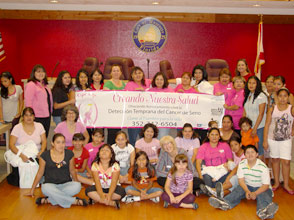 In the past five years, Creando Nuestra Salud has trained over 150 lay-health workers to use interactive teaching tools and fotonovelas to empower women to practice early breast cancer detection activities (breast self-exam, clinical visits and mammograms). By September 2011, over 2400 women had received one-on-one trainings as a result of the lay-health worker program.
In the past five years, Creando Nuestra Salud has trained over 150 lay-health workers to use interactive teaching tools and fotonovelas to empower women to practice early breast cancer detection activities (breast self-exam, clinical visits and mammograms). By September 2011, over 2400 women had received one-on-one trainings as a result of the lay-health worker program.
Creando Nuestra Salud is a shining example of a community-based health project. This breast health project grew out of the needs identified by Alianza de Mujeres Activas (AMA) in Central Florida. With funding from the Florida Breast Cancer Coalition Research Foundation, the Central Florida Affiliate of Susan G. Komen for the Cure® and the Florida Division of the American Cancer Society, the RWHP has worked with rural communities throughout Florida and Central Kentucky in the development, evaluation and distribution of these materials.
The goal of the program, Creando Nuestra Salud (Creating Our Health) is to reduce late detection of breast cancer among Hispanic, Spanish-speaking women living in Lake, Putnam, Volusia, Levy, Orange, Osceola and Alachua Counties through one-on-one education.
Since 1991 the Rural Women's Health Project (RWHP) has held steadfast to its mission: to work with rural communities in order to strengthen their capacity to overcome health barriers. One of the greatest health disparities facing the women in this community is the high rate of death from breast cancer due to late detection. Therefore, to diminish these rates, the RWHP's Creando Nuestra Salud (CNS) (Creating Our Health) project will increase the participation of Hispanic women, who reside in rural areas, 40 years of age and older, in early breast cancer detection screenings through evidence-based, one-on-one peer education and referrals.
CNS focuses on reaching Hispanic women who are often without a medical home and have limited access to reliable prevention information in Spanish. CNS is a holistic approach to reaching out to this population that faces many health obstacles. Therefore, RWHP established partnerships with four medical facilities, anxious to serve their target communities. The Medical Partners are: Shand's Mobile Outreach Clinic in Alachua, Family Medical and Dental (serving Putnam and Volusia counties), Community Health Centers, Inc. (serving Orange, Lake and Osceola) and Levy County Health Department in Levy County.
The RWHP will hold workshops to train coordinators from community-based partners. The partner coordinators will return to their respective communities and each recruit ten women to become Peer Educator. The CNS program trains peer educators to follow a fluid, scripted guide to replicate the early detection message with each woman contact. Once trained, each peer educator will be responsible for carrying out ten, one-on-one, "orientaciones" (teachings) each month for two months (a total of 20 contact per peer educator) with Hispanic women in their community. Women will learn about early screening including breast self-exams, be linked to medical facilities for clinical and mammograms services and be educated about medical and social services in their area with a La Guia (Resource Guide) for the county in which they reside.
Follow the guidance and warm advice from Hispanic women in El Susto de Marta (Marta’s Scare) and Lo Que Dicen Mis Amigas Sobre El Cáncer Del Seno (What My Friends Say About Breast Cancer), two fotonovelas that emphasize early detection and include instructions for the BSE.
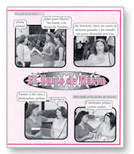 El Susto de Marta
El Susto de Marta
When Marta finds a lump in her breast, she is faced with the fear of breast cancer. Marta’s friends discover her scare and also realize just how susceptible they are to the disease. Join Marta as she converts her fear to strength in order to teach others how to detect breast cancer by providing clear steps of the breast self-exam and emphasizing the importance of early detection to her family and friends.
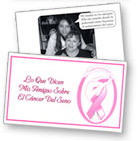 Lo Que Dicen Mis Amigas Sobre El Cáncer Del Seno
Lo Que Dicen Mis Amigas Sobre El Cáncer Del Seno
Hispanic women, from different walks of life, share the importance of early detection, celebrate their value to their family and care for their breast health in this advice novela. The simple steps to practicing a breast self-exam are presented through a simple, visual demonstration.
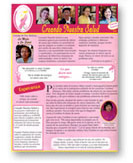 Creando Nuestra Salud Revista
Creando Nuestra Salud Revista
This four-page magazine infuses the same intimacy as the other materials, while enhancing breast cancer awareness with information about tumor sizes, treatment options and messages encouraging the BSE.
Creando Nuestra Salud is a curriculum, which can be implemented in new and existing lay-health worker programs. The curriculum includes the lay-health worker training, activities, lists of materials, contact forms, resources and outreach activity packets to support the lay-health worker’s community education.
The RWHP offers this complete curriculum or you can contact us to discuss Capacity-Building support to make your program available as you initiate a Creando Nuestra Salud program.
To date, 70 lay-health workers have carried out the Creando Nuestra Salud breast health education program to women in three states, reaching over 1000 women with face-to-face education.
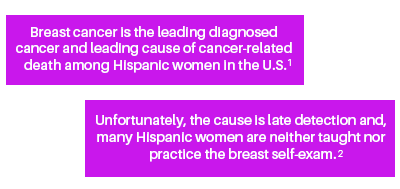
1American Cancer Society, (2008). Cancer Statistics: "Figure 3. Leading sites of new cancer cases and deaths among hispanics, 2006 estimates," "Female breast." Cancer Facts & Figures for Hispanics/Latinos 2006-2008, Retrieved August 29, 2008, from http://www.cancer.org/downloads/STT/CAFF2006HispPWSecured.pdf.
2(2007). Rural Women’s Health Project. Lake County Hispanic Health Survey, 2007. In a survey conducted in Lake County, Fl., 57 percent of women respondents reported that they do not practice the breast self-exam, 29 percent of women respondents reported that they had never conducted the exam, and 13 percent of women respondents reported that they were never taught the breast self-exam.
Click on the images below to view the CNS Promotores in training.